Fleurs du Mal Magazine


Or see the index
Kate Tempest: Brand New Ancients On Film
– Part 3 –
In November 2013, performance poet Kate Tempest and Battersea Arts Centre, embarked on a journey together to tour the award winning show Brand New Ancients.
The tour includes 9 London venues including the Royal Opera House, Harrow Arts Centre, Lyric Hammersmith and Battersea Arts Centre, as well as 5 regional venues across the country from Contact in Manchester to Brighton Dome as well as heading to New York at St. Ann’s Warehouse.
In collaboration with director Joe Roberts, Battersea Arts Centre has produced three short films interpreting Kate’s spoken word through moving image, which will be released across the tour.
This is the third of the three part series:
Part one can be found here: http://www.youtube.com/watch?v=JLWlB3ib7ZM
Part two can be found here: http://www.youtube.com/watch?v=UpqJZrVwZTw
Directed by Joe Roberts
Drawings by Mista Breakfast
Movement and composition by Berkavitch.
Produced by Battersea Arts Centre
Brand New Ancients is written by Kate Tempest
A Kate Tempest & Battersea Arts Centre Co-production
Co-commissioned by the Albany
More info and tickets: # http://brandnewancientstour.com/
15 apr. 2014
kate tempest poetry
fleursdumal.nl magazine
More in: Archive S-T, AUDIO, CINEMA, RADIO & TV, Kate/Kae Tempest, Tempest, Kate/Kae
 The Sorrows of Young Werther (29) by J.W. von Goethe ♦ AUGUST 18. ♦ Must it ever be thus,–that the source of our happiness must also be the fountain of our misery? The full and ardent sentiment which animated my heart with the love of nature, overwhelming me with a torrent of delight, and which brought all paradise before me, has now become an insupportable torment, a demon which perpetually pursues and harasses me. When in bygone days I gazed from these rocks upon yonder mountains across the river, and upon the green, flowery valley before me, and saw all nature budding and bursting around; the hills clothed from foot to peak with tall, thick forest trees; the valleys in all their varied windings, shaded with the loveliest woods; and the soft river gliding along amongst the lisping reeds, mirroring the beautiful clouds which the soft evening breeze wafted across the sky,–when I heard the groves about me melodious with the music of birds, and saw the million swarms of insects dancing in the last golden beams of the sun, whose setting rays awoke the humming beetles from their grassy beds, whilst the subdued tumult around directed my attention to the ground, and I there observed the arid rock compelled to yield nutriment to the dry moss, whilst the heath flourished upon the barren sands below me, all this displayed to me the inner warmth which animates all nature, and filled and glowed within my heart. I felt myself exalted by this overflowing fulness to the perception of the Godhead, and the glorious forms of an infinite universe became visible to my soul!
The Sorrows of Young Werther (29) by J.W. von Goethe ♦ AUGUST 18. ♦ Must it ever be thus,–that the source of our happiness must also be the fountain of our misery? The full and ardent sentiment which animated my heart with the love of nature, overwhelming me with a torrent of delight, and which brought all paradise before me, has now become an insupportable torment, a demon which perpetually pursues and harasses me. When in bygone days I gazed from these rocks upon yonder mountains across the river, and upon the green, flowery valley before me, and saw all nature budding and bursting around; the hills clothed from foot to peak with tall, thick forest trees; the valleys in all their varied windings, shaded with the loveliest woods; and the soft river gliding along amongst the lisping reeds, mirroring the beautiful clouds which the soft evening breeze wafted across the sky,–when I heard the groves about me melodious with the music of birds, and saw the million swarms of insects dancing in the last golden beams of the sun, whose setting rays awoke the humming beetles from their grassy beds, whilst the subdued tumult around directed my attention to the ground, and I there observed the arid rock compelled to yield nutriment to the dry moss, whilst the heath flourished upon the barren sands below me, all this displayed to me the inner warmth which animates all nature, and filled and glowed within my heart. I felt myself exalted by this overflowing fulness to the perception of the Godhead, and the glorious forms of an infinite universe became visible to my soul!  Stupendous mountains encompassed me, abysses yawned at my feet, and cataracts fell headlong down before me; impetuous rivers rolled through the plain, and rocks and mountains resounded from afar. In the depths of the earth I saw innumerable powers in motion, and multiplying to infinity; whilst upon its surface, and beneath the heavens, there teemed ten thousand varieties of living creatures. Everything around is alive with an infinite number of forms; while mankind fly for security to their petty houses, from the shelter of which they rule in their imaginations over the wide-extended universe. Poor fool! in whose petty estimation all things are little. From the inaccessible mountains, across the desert which no mortal foot has trod, far as the confines of the unknown ocean,breathes the spirit of the eternal Creator; and every atom to which he has given existence finds favour in his sight. Ah, how often at that time has the flight of a bird, soaring above my head, inspired me with the desire of being transported to the shores of the immeasurable waters, there to quaff the pleasures of life from the foaming goblet of the Infinite, and to partake, if but for a moment even, with the confined powers of my soul, the beatitude of that Creator who accomplishes all things in himself, and through himself!
Stupendous mountains encompassed me, abysses yawned at my feet, and cataracts fell headlong down before me; impetuous rivers rolled through the plain, and rocks and mountains resounded from afar. In the depths of the earth I saw innumerable powers in motion, and multiplying to infinity; whilst upon its surface, and beneath the heavens, there teemed ten thousand varieties of living creatures. Everything around is alive with an infinite number of forms; while mankind fly for security to their petty houses, from the shelter of which they rule in their imaginations over the wide-extended universe. Poor fool! in whose petty estimation all things are little. From the inaccessible mountains, across the desert which no mortal foot has trod, far as the confines of the unknown ocean,breathes the spirit of the eternal Creator; and every atom to which he has given existence finds favour in his sight. Ah, how often at that time has the flight of a bird, soaring above my head, inspired me with the desire of being transported to the shores of the immeasurable waters, there to quaff the pleasures of life from the foaming goblet of the Infinite, and to partake, if but for a moment even, with the confined powers of my soul, the beatitude of that Creator who accomplishes all things in himself, and through himself!
My dear friend, the bare recollection of those hours still consoles me. Even this effort to recall those ineffable sensations, and give them utterance, exalts my soul above itself, and makes me doubly feel the intensity of my present anguish.
It is as if a curtain had been drawn from before my eyes, and, instead of prospects of eternal life, the abyss of an ever open grave yawned before me. Can we say of anything that it exists when all passes away, when time, with the speed of a storm, carries all things onward,–and our transitory existence, hurried along by the torrent, is either swallowed up by the waves or dashed against the rocks? There is not a moment but preys upon you,–and upon all around you, not a moment in which you do not yourself become a destroyer. The most innocent walk deprives of life thousands of poor insects: one step destroys the fabric of the industrious ant, and converts a little world into chaos. No: it is not the great and rare calamities of the world, the floods which sweep away whole villages, the earthquakes which swallow up our towns, that affect me. My heart is wasted by the thought of that destructive power which lies concealed in every part of universal nature. Nature has formed nothing that does not consume itself, and every object near it: so that, surrounded by earth and air, and all the active powers, Iwander on my way with aching heart; and the universe is to me a fearful monster, for ever devouring its own offspring.
The Sorrows of Young Werther (Die Leiden des jungen Werther) by J.W. von Goethe. Translated by R.D. Boylan
To be continued
fleursdumal.nl magazine for art & literature
More in: -Die Leiden des jungen Werther, Goethe, Johann Wolfgang von

Afgemat vosje
Ha, wat schudde hij die stomme honden
toch weer makkelijk van zich af. Zijn tong
glanst vochtig als deze bessenstruik.
Hoe trilt de weke flank na van die straffe
draf, de angst nog in zijn buik. Het gezin
liet hij stil in een hol in slaap, de jongen
zacht tegen zijn wijfje aan. Wat verlangt de rekel
naar haar warme lijfje. Maar in avondschemer
houdt het verre meutejanken hem voorlopig in
dicht kreupelhout. Dit is míjn woud, dit zijn mijn
bomen. Blijf van al mijn mooie holle wegen weg
toch, denkt de vos. En snakt naar lange rosse dromen.
Bert Bevers
Verschenen in Die felle…. – Gedichten over vossen, Uitgeverij Gianni, Maastricht, 2005
fleursdumal.nl magazine
More in: Archive A-B, Bevers, Bert
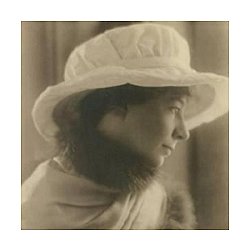
Sara Teasdale
(1884 – 1933)
Swans
Night is over the park, and a few brave stars
Look on the lights that link it with chains of gold,
The lake bears up their reflection in broken bars
That seem too heavy for tremulous water to hold.
We watch the swans that sleep in a shadowy place,
And now and again one wakes and uplifts its head;
How still you are–your gaze is on my face–
We watch the swans and never a word is said.
Sara Teasdale poetry
fleursdumal.nl magazine
More in: Archive S-T, MUSEUM OF NATURAL HISTORY - department of ravens & crows, birds of prey, riding a zebra, spring, summer, autumn, winter, Teasdale, Sara
Acht vertalingen van gedichten van T.T. Cloete (1924) door Carina van der Walt & Geno Spoormans
T.T. Cloete
Oranjerivier
Hy is oud.
Onuitputlik hou hy stokoud aan
van voor die geskiedenis se ontstaan.
Hy is stoer
en vol nukke is hy geaard.
Dán loop hy met vaart,
dàn is sy gang ’n dun sloer.
Vir wie hom wil bevaar
is hy onvriendelik en ontoeganklik.
Hy loop soos sy likkewaan swik.
Stadig voel-voel mik
hy waggelend na links, na regs, heen en weer,
dán na algulhas en dàn na die ewenaar
se kant.
Hy het die baber en geelvis geleer
om soos hyself stadig te laveer.
Hy tel vaarlandswilgers en fluitjiesriet
op en landerye en vee weerskante.
In hom dra hy son- en maanlig en hy voel diamante
diep uit die aarde se ingewande
uit. Hy poleer die graniet.
Met die uithouvermoë en durf vir langafstand
loop die sleurmaratonatleet dwarsoor die land.
Dwarsoor die kontinent loop
hy dwarstes oop
en alle weerstande,
hy pyl deur ravyne,
gaan deur vlaktes tussen koppies en rante
deur, verby stede en dorpies, oor plase, deur dor woestyne
en neem van alles iets saam, hoe gering ook al,
weste toe, na die diep weste toe, miriadeskere sonder tal,
waar hy saam met sonne die een na die ander afval
sedert genesis, af, af, áf in die diepte voor sy mond,
agter, ágter die see in, in ’n onlesbare dors afgrond.
T.T. Cloete
Oranjerivier*
Hij is oud.
Onuitputtelijk en star houdt hij aan
om de geschiedenis voor te gaan.
Hij is stoer
en vol nukken geaard.
Dán loopt hij in volle vaart
dàn weer als een snoer.
Wie hem ook al bevaart
hij is onvriendelijk en zijn doorgang wrikt.
Hij loopt zoals zijn leguaan zwikt
en langzaam op goed gevoel mikt.
Hij waggelt naar links, naar rechts, heen en weer,
dán naar algulhas en dàn naar de evenaar.
Hij moest de meerval en barbeel leren
om zoals hijzelf bedaard te laveren.
Hij neemt treurwilgen mee en riet
en landerijen en vee van weerskanten.
In zich draagt hij zon- en maanlicht. Hij woelt diamanten
diep uit de ingewanden van de aarde
los. Hij polijst het graniet.
Met een volharding en moed voor de lange afstand
loopt deze sleurmarathonatleet dwars door het land.
Dwars door het continent snijdt
hij door dwarsheid
en alle weerstanden,
hij schiet door ravijnen,
leidt door vlaktes met heuvels aan de randen
voorbij steden en dorpjes, over landerijen, door dorre woestijnen
hij neemt van alles iets mee, hoe gering ook al,
naar het westen, het diepe westen, der duizenden malen zonder tal,
waar hij samen met zonnen ondergaat in verval
sedert genesis, af, af, áf in de diepte voor zijn mond,
ginder, ginder de zee in, in een onlesbaar dorstige afgrond.
*sinds 1996 bekend als de Gariep
T.T. Cloete 8 gedichten: Vertalingen uit het Zuid-Afrikaans door Carina van der Walt & Geno Spoormans, 2010
(wordt vervolgd)
fleursdumal.nl magazine
More in: Archive C-D, T .T. Cloete, Walt & Spoormans

The Sorrows of Young Werther (28) by J.W. von Goethe ♦AUGUST 15. ♦ There can be no doubt that in this world nothing is so indispensable as love. I observe that Charlotte could not lose me without a pang, and the very children have but one wish; that is, that I should visit them again to-morrow. I went this afternoon to tune Charlotte’s piano. But I could not do it, for the little ones insisted on my telling them a story; and Charlotte herself urged me to satisfy them. I waited upon them at tea, and they are now as fully contented with me as with Charlotte; and I told them my very best tale of the princess who was waited upon by dwarfs. I improve myself by this exercise, and am quite surprised at the impression my stories create. If I sometimes invent an incident which I forget upon the next narration, they remind one directly that the story was different before; so that I now endeavour to relate with exactness the same anecdote in the same monotonous tone, which never changes. I find by this, how much an author injures his works by altering them, even though they be improved in a poetical point of view. The first impression is readily received. We are so constituted that we believe the most incredible things; and, once they are engraved upon the memory, woe to him who would endeavour to efface them.
The Sorrows of Young Werther (Die Leiden des jungen Werther) by J.W. von Goethe. Translated by R.D. Boylan.
To be continued
fleursdumal.nl magazine for art & literature
More in: -Die Leiden des jungen Werther, Goethe, Johann Wolfgang von
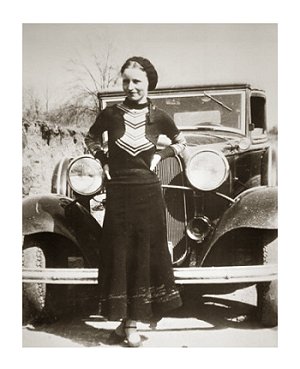
Bonnie Elizabeth Parker
(1910 – 1934)
The story of “Suicide Sal”
We each of us have a good “alibi”
For being down here in the “joint”
But few of them really are justified
If you get right down to the point.
You’ve heard of a woman’s glory
Being spent on a “downright cur”
Still you can’t always judge the story
As true, being told by her.
As long as I’ve stayed on this “island”
And heard “confidence tales” from each “gal”
Only one seemed interesting and truthful-
The story of “Suicide Sal”.
Now “Sal” was a gal of rare beauty,
Though her features were coarse and tough;
She never once faltered from duty
To play on the “up and up”.
“Sal” told me this tale on the evening
Before she was turned out “free”
And I’ll do my best to relate it
Just as she told it to me:
I was born on a ranch in Wyoming;
Not treated like Helen of Troy,
I was taught that “rods were rulers”
And “ranked” as a greasy cowboy.
Then I left my old home for the city
To play in its mad dizzy whirl,
Not knowing how little of pity
It holds for a country girl.
There I fell for “the line” of a “henchman”
A “professional killer” from “Chi”
I couldn’t help loving him madly,
For him even I would die.
One year we were desperately happy
Our “ill gotten gains” we spent free,
I was taught the ways of the “underworld”
Jack was just like a “god” to me.
I got on the “F.B.A.” payroll
To get the “inside lay” of the “job”
The bank was “turning big money”!
It looked like a “cinch for the mob”.
Eighty grand without even a “rumble”-
Jack was last with the “loot” in the door,
When the “teller” dead-aimed a revolver
From where they forced him to lie on the floor.
I knew I had only a moment-
He would surely get Jack as he ran,
So I “staged” a “big fade out” beside him
And knocked the forty-five out of his hand.
They “rapped me down big” at the station,
And informed me that I’d get the blame
For the “dramatic stunt” pulled on the “teller”
Looked to them, too much like a “game”.
The “police” called it a “frame-up”
Said it was an “inside job”
But I steadily denied any knowledge
Or dealings with “underworld mobs”.
The “gang” hired a couple of lawyers,
The best “fixers” in any mans town,
But it takes more than lawyers and money
When Uncle Sam starts “shaking you down”.
I was charged as a “scion of gangland”
And tried for my wages of sin,
The “dirty dozen” found me guilty-
From five to fifty years in the pen.
I took the “rap” like good people,
And never one “squawk” did I make
Jack “dropped himself” on the promise
That we make a “sensational break”.
Well, to shorten a sad lengthy story,
Five years have gone over my head
Without even so much as a letter-
At first I thought he was dead.
But not long ago I discovered;
From a gal in the joint named Lyle,
That Jack and his “moll” had “got over”
And were living in true “gangster style”.
If he had returned to me sometime,
Though he hadn’t a cent to give
I’d forget all the hell that he’s caused me,
And love him as long as I lived.
But there’s no chance of his ever coming,
For he and his moll have no fears
But that I will die in this prison,
Or “flatten” this fifty years.
Tommorow I’ll be on the “outside”
And I’ll “drop myself” on it today,
I’ll “bump ’em if they give me the “hotsquat”
On this island out here in the bay…
The iron doors swung wide next morning
For a gruesome woman of waste,
Who at last had a chance to “fix it”
Murder showed in her cynical face.
Not long ago I read in the paper
That a gal on the East Side got “hot”
And when the smoke finally retreated,
Two of gangdom were found “on the spot”.
It related the colorful story
Of a “jilted gangster gal”
Two days later, a “sub-gun” ended
The story of “Suicide Sal”.
Bonnie Elizabeth Parker (October 1, 1910 – May 23, 1934) and Clyde Chestnut Barrow (March 24, 1909 – May 23, 1934) were well-known (as Bonnie & Clyde) American outlaws and bankrobbers. They were both killed in a police ambush on May 23, 1934. Bonnie Parker wrote most of her poems, while in jail, in a little notebook she had obtained from The First National Bank of Burkburnett, Texas.
Bonnie Parker poetry
fleursdumal.nl magazine
More in: Archive O-P, Archive O-P, Bonnie and Clyde, Bonnie Parker, CRIME & PUNISHMENT, Suicide, Western Fiction
 The Sorrows of Young Werther (27) by J.W. von Goethe ♦ AUGUST 12. ♦ Certainly Albert is the best fellow in the world. I had a strange scene with him yesterday. I went to take leave of him; for I took it into my head to spend a few days in these mountains, from where I now write to you. As I was walking up and down his room, my eye fell upon his pistols. “Lend me those pistols,” said I, “for my journey.” “By all means,” he replied, “if you will take the trouble to load them; for they only hang there for form.” I took down one of them; and he continued, “Ever since I was near suffering for my extreme caution, I will have nothing to do with such things.” I was curious to hear the story. “I was staying,” said he, “some three months ago, at a friend’s house in the country. I had a brace of pistols with me, unloaded; and I slept without any anxiety. One rainy afternoon I was sitting by myself, doing nothing, when it occurred to me I do not know how that the house might be attacked, that we might require the pistols, that we might in short, you know how we go on fancying, when we have nothing better to do. I gave the pistols to the servant, to clean and load. He was playing with the maid, and trying to frighten her, when the pistol went off–God knows how!–the ramrod was in the barrel; and it went straight through her right hand, and shattered the thumb. I had to endure all the lamentation, and to pay the surgeon’s bill; so, since that time, I have kept all my weapons unloaded. But, my dear friend, what is the use of prudence? We can never be on our guard against all possible dangers.
The Sorrows of Young Werther (27) by J.W. von Goethe ♦ AUGUST 12. ♦ Certainly Albert is the best fellow in the world. I had a strange scene with him yesterday. I went to take leave of him; for I took it into my head to spend a few days in these mountains, from where I now write to you. As I was walking up and down his room, my eye fell upon his pistols. “Lend me those pistols,” said I, “for my journey.” “By all means,” he replied, “if you will take the trouble to load them; for they only hang there for form.” I took down one of them; and he continued, “Ever since I was near suffering for my extreme caution, I will have nothing to do with such things.” I was curious to hear the story. “I was staying,” said he, “some three months ago, at a friend’s house in the country. I had a brace of pistols with me, unloaded; and I slept without any anxiety. One rainy afternoon I was sitting by myself, doing nothing, when it occurred to me I do not know how that the house might be attacked, that we might require the pistols, that we might in short, you know how we go on fancying, when we have nothing better to do. I gave the pistols to the servant, to clean and load. He was playing with the maid, and trying to frighten her, when the pistol went off–God knows how!–the ramrod was in the barrel; and it went straight through her right hand, and shattered the thumb. I had to endure all the lamentation, and to pay the surgeon’s bill; so, since that time, I have kept all my weapons unloaded. But, my dear friend, what is the use of prudence? We can never be on our guard against all possible dangers.
However,”–now, you must know I can tolerate all men till they come to “however;”–for it is self-evident that every universal rule must have its exceptions. But he is so exceedingly accurate, that, if he only fancies he has said a word too precipitate, or too general, or only half true, he never ceases to qualify, to modify, and extenuate, till at last he appears to have said nothing at all. Upon this occasion, Albert was deeply immersed in his subject: I ceased to listen to him, and became lost in reverie. With a sudden motion, I pointed the mouth of the pistol to my forehead, over the right eye. “What do you mean?” cried Albert, turning back the pistol. “It is not loaded,” said I. “And even if not,” he answered with impatience, “what can you mean? I cannot comprehend how a man can be so mad as to shoot himself, and the bare idea of it shocks me.”
“But why should any one,” said I, “in speaking of an action, venture to pronounce it mad or wise, or good or bad? What is the meaning of all this? Have you carefully studied the secret motives of our actions? Do you understand–can you explain the causes which occasion them, and make them inevitable? If you can, you will be less hasty with your decision.”
“But you will allow,” said Albert; “that some actions are criminal, let them spring from whatever motives they may.” I granted it, and shrugged my shoulders.
“But still, my good friend,” I continued, “there are some exceptions here too. Theft is a crime; but the man who commits it from extreme poverty, with no design but to save his family from perishing, is he anobject of pity, or of punishment? Who shall throw the first stone at a husband, who, in the heat of just resentment, sacrifices his faithless wife and her perfidious seducer? or at the young maiden, who, in her weak hour of rapture, forgets herself in the impetuous joys of love?
Even our laws, cold and cruel as they are, relent in such cases, and withhold their punishment.”
 “That is quite another thing,” said Albert; “because a man under the influence of violent passion loses all power of reflection, and is regarded as intoxicated or insane.”
“That is quite another thing,” said Albert; “because a man under the influence of violent passion loses all power of reflection, and is regarded as intoxicated or insane.”
“Oh! you people of sound understandings,” I replied, smiling, “are ever ready to exclaim ‘Extravagance, and madness, and intoxication!’ You moral men are so calm and so subdued! You abhor the drunken man, and detest the extravagant; you pass by, like the Levite, and thank God, like the Pharisee, that you are not like one of them. I have been more than once intoxicated, my passions have always bordered on extravagance: I am not ashamed to confess it; for I have learned, by my own experience, that all extraordinary men, who have accomplished great and astonishing actions, have ever been decried by the world as drunken or insane. And in private life, too, is it not intolerable that no one can undertake the execution of a noble or generous deed, without giving rise to the exclamation that the doer is intoxicated or mad? Shame upon you, ye sages!”
“This is another of your extravagant humours,” said Albert: “you always exaggerate a case, and in this matter you are undoubtedly wrong; for we were speaking of suicide, which you compare with great actions, when it is impossible to regard it as anything but a weakness. It is much easier to die than to bear a life of misery with fortitude.”
I was on the point of breaking off the conversation, for nothing puts me so completely out of patience as the utterance of a wretched commonplace when I am talking from my inmost heart. However, I composed myself, for I had often heard the same observation with sufficient vexation; and I answered him, therefore, with a little warmth, “You call this a weakness–beware of being led astray by appearances. When a nation, which has long groaned under the intolerable yoke of a tyrant, rises at last and throws off its chains, do you call that weakness? The man who, to rescue his house from the flames, finds his physical strength redoubled, so that he lifts burdens with ease, which, in the absence of excitement, he could scarcely move; he who, under the rage of an insult, attacks and puts to flight half a score of his enemies, are such persons to be called weak? My good friend, if resistance be strength, how can the highest degree of resistance be a weakness?”
Albert looked steadfastly at me, and said, “Pray forgive me, but I do not see that the examples you have adduced bear any relation to the question.” “Very likely,” I answered; “for I have often been told that my style of illustration borders a little on the absurd. But let us see if we cannot place the matter in another point of view, by inquiring what can be a man’s state of mind who resolves to free himself from the burden of life,–a burden often so pleasant to bear,–for we cannot otherwise reason fairly upon the subject.
“Human nature,” I continued, “has its limits. It is able to endure a certain degree of joy, sorrow, and pain, but becomes annihilated as soon as this measure is exceeded. The question, therefore, is, not whether a man is strong or weak, but whether he is able to endure the measure of his sufferings. The suffering may be moral or physical; and in my opinion it is just as absurd to call a man a coward who destroys himself, as to call a man a coward who dies of a malignant fever.”
“Paradox, all paradox!” exclaimed Albert. “Not so paradoxical as you imagine,” I replied. “You allow that we designate a disease as mortal when nature is so severely attacked, and her strength so far exhausted, that she cannot possibly recover her former condition under any change that may take place.
“Now, my good friend, apply this to the mind; observe a man in his natural, isolated condition; consider how ideas work, and how impressions fasten on him, till at length a violent passion seizes him, destroying all his powers of calm reflection, and utterly ruining him.
“It is in vain that a man of sound mind and cool temper understands the condition of such a wretched being, in vain he counsels him. He can no more communicate his own wisdom to him than a healthy man can instil his strength into the invalid, by whose bedside he is seated.”
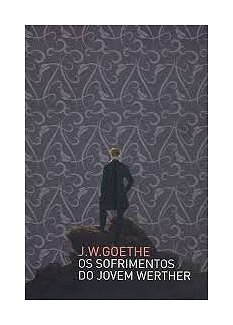 Albert thought this too general. I reminded him of a girl who had drowned herself a short time previously, and I related her history. She was a good creature, who had grown up in the narrow sphere of household industry and weekly appointed labour; one who knew no pleasure beyond indulging in a walk on Sundays, arrayed in her best attire, accompanied by her friends, or perhaps joining in the dance now and then at some festival, and chatting away her spare hours with a neighbour, discussing the scandal or the quarrels of the village, trifles sufficient to occupy her heart. At length the warmth of her nature is influenced by certain new and unknown wishes. Inflamed by the flatteries of men, her former pleasures become by degrees insipid, till at length she meets with a youth to whom she is attracted by an indescribable feeling; upon him she now rests all her hopes; she forgets the world around her; she sees, hears, desires nothing but him, and him only. He alone occupies all her thoughts. Uncorrupted by the idle indulgence of an enervating vanity, her affection moving steadily toward its object, she hopes to become his, and to realise, in an everlasting union with him, all that happiness which she sought, all that bliss for which she longed. His repeated promises confirm her hopes: embraces and endearments, which increase the ardour of her desires, overmaster her soul. She floats in a dim, delusive anticipation of her happiness; and her feelings become excited to their utmost tension. She stretches out her arms finally to embrace the object of all her wishes and her lover forsakes her. Stunned and bewildered, she stands upon a precipice. All is darkness around her. No prospect, no hope, no consolation–forsaken by him in whom her existence was centred! She sees nothing of the wide world before her, thinks nothing of the many individuals who might supply the void in her heart; she feels herself deserted, forsaken by the world; and, blinded and impelled by the agony which wrings her soul, she plunges into the deep, to end her sufferings in the broad embrace of death. See here, Albert, the history of thousands; and tell me, is not this a case of physical infirmity? Nature has no way to escape from the labyrinth: her powers are exhausted: she can contend no longer, and the poor soul must die.
Albert thought this too general. I reminded him of a girl who had drowned herself a short time previously, and I related her history. She was a good creature, who had grown up in the narrow sphere of household industry and weekly appointed labour; one who knew no pleasure beyond indulging in a walk on Sundays, arrayed in her best attire, accompanied by her friends, or perhaps joining in the dance now and then at some festival, and chatting away her spare hours with a neighbour, discussing the scandal or the quarrels of the village, trifles sufficient to occupy her heart. At length the warmth of her nature is influenced by certain new and unknown wishes. Inflamed by the flatteries of men, her former pleasures become by degrees insipid, till at length she meets with a youth to whom she is attracted by an indescribable feeling; upon him she now rests all her hopes; she forgets the world around her; she sees, hears, desires nothing but him, and him only. He alone occupies all her thoughts. Uncorrupted by the idle indulgence of an enervating vanity, her affection moving steadily toward its object, she hopes to become his, and to realise, in an everlasting union with him, all that happiness which she sought, all that bliss for which she longed. His repeated promises confirm her hopes: embraces and endearments, which increase the ardour of her desires, overmaster her soul. She floats in a dim, delusive anticipation of her happiness; and her feelings become excited to their utmost tension. She stretches out her arms finally to embrace the object of all her wishes and her lover forsakes her. Stunned and bewildered, she stands upon a precipice. All is darkness around her. No prospect, no hope, no consolation–forsaken by him in whom her existence was centred! She sees nothing of the wide world before her, thinks nothing of the many individuals who might supply the void in her heart; she feels herself deserted, forsaken by the world; and, blinded and impelled by the agony which wrings her soul, she plunges into the deep, to end her sufferings in the broad embrace of death. See here, Albert, the history of thousands; and tell me, is not this a case of physical infirmity? Nature has no way to escape from the labyrinth: her powers are exhausted: she can contend no longer, and the poor soul must die.
“Shame upon him who can look on calmly, and exclaim, ‘The foolish girl! she should have waited; she should have allowed time to wear off the impression; her despair would have been softened, and she would have found another lover to comfort her.’ One might as well say, ‘The fool, to die of a fever! why did he not wait till his strength was restored, till his blood became calm? all would then have gone well, and he would have been alive now.'”
Albert, who could not see the justice of the comparison, offered some further objections, and, amongst others, urged that I had taken the case of a mere ignorant girl. But how any man of sense, of more enlarged views and experience, could be excused, he was unable to comprehend. “My friend!” I exclaimed, “man is but man; and, whatever be the extent of his reasoning powers, they are of little avail when passion rages within, and he feels himself confined by the narrow limits of nature.
It were better, then–but we will talk of this some other time,” I said, and caught up my hat. Alas! my heart was full; and we parted without conviction on either side. How rarely in this world do men understand each other!
The Sorrows of Young Werther (Die Leiden des jungen Werther) by J.W. von Goethe. Translated by R.D. Boylan.
To be continued
fleursdumal.nl magazine for art & literature
More in: -Die Leiden des jungen Werther, Goethe, Johann Wolfgang von

De vergeten winter
Frank Pollet opgedragen, maart 2014
Bekeken door de zeef van geduld heeft tijd
hier geen heft. Zie beenbreek en ogentroost:
de lente gaat droog als naaldhout open.
Alsof ineens de zon zijn gedachten bezingt.
Regen laat zich lastig wegen, kent geen spijt
omdat men treurt om een verloren oogst.
Wijsjes met een vederlicht vibrato lopen
hoog op. Ze lijken wel bergdauw. Er klinkt
bezoeming als door hommels in het hoofd,
de dag tot aan de ogen diep in de lauwe inkt.
Bert Bevers
Ongepubliceerd
fleursdumal.nl magazine
More in: 4SEASONS#Winter, Archive A-B, Bevers, Bert
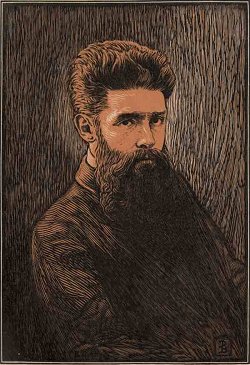
Charles Guérin
(1873-1907)
La maison dort
La maison dort au coeur de quelque vieille ville
Où des dames s’en vont, lasses de bonnes oeuvres,
S’assoupir en suivant l’office de six heures,
Ville où le rouet gris de l’ennui se dévide.
Dans la cour un bassin où pleurent les eaux vives
D’avoir vu verdir les Tritons et d’être seules.
Et la maison laisse gémir les eaux jaseuses ;
Ses yeux sont noirs où s’avivaient jadis les vitres,
Et, vers le soir, les cuivres du soleil s’éteignent
Sur les plafonds tendus de terreuses dentelles
Qu’un coup de vent parfois tord comme des écharpes.
Les mites ont aimé dans les tentures ternes ;
Aussi, charme décoloré des chambres, charme
Des rêves qu’on a trop songés et qui se taisent.
Charles Guérin poetry
fleursdumal.nl magazine
More in: Archive G-H, CLASSIC POETRY

Sara Teasdale
(1884 – 1933)
In the Metropolitan Museum
Within the tiny Pantheon
We stood together silently,
Leaving the restless crowd awhile
As ships find shelter from the sea.
The ancient centuries came back
To cover us a moment’s space,
And thro’ the dome the light was glad
Because it shone upon your face.
Ah, not from Rome but farther still,
Beyond sun-smitten Salamis,
The moment took us, till you stooped
To find the present with a kiss.
Sara Teasdale poetry
fleursdumal.nl magazine
More in: Archive S-T, Teasdale, Sara
 The Sorrows of Young Werther (26) by J.W. von Goethe ♦ AUGUST 10. ♦ If I were not a fool, I could spend the happiest and most delightful life here. So many agreeable circumstances, and of a kind to ensure a worthy man’s happiness, are seldom united. Alas! I feel it too sensibly,–the heart alone makes our happiness! To be admitted into this most charming family, to be loved by the father as a son, by the children as a father, and by Charlotte! then the noble Albert, who never disturbs my happiness by any appearance of ill-humour, receiving me with the heartiest affection, and loving me, next to Charlotte, better than all the world! Wilhelm, you would be delighted to hear us in our rambles, and conversations about Charlotte. Nothing in the world can be more absurd than our connection, and yet the thought of it often moves me to tears.
The Sorrows of Young Werther (26) by J.W. von Goethe ♦ AUGUST 10. ♦ If I were not a fool, I could spend the happiest and most delightful life here. So many agreeable circumstances, and of a kind to ensure a worthy man’s happiness, are seldom united. Alas! I feel it too sensibly,–the heart alone makes our happiness! To be admitted into this most charming family, to be loved by the father as a son, by the children as a father, and by Charlotte! then the noble Albert, who never disturbs my happiness by any appearance of ill-humour, receiving me with the heartiest affection, and loving me, next to Charlotte, better than all the world! Wilhelm, you would be delighted to hear us in our rambles, and conversations about Charlotte. Nothing in the world can be more absurd than our connection, and yet the thought of it often moves me to tears.
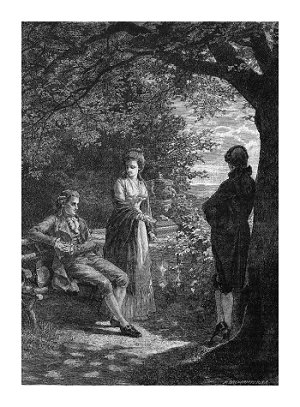 He tells me sometimes of her excellent mother; how, upon her death-bed, she had committed her house and children to Charlotte, and had given Charlotte herself in charge to him; how, since that time, a new spirit had taken possession of her; how, in care and anxiety for their welfare, she became a real mother to them; how every moment of her time was devoted to some labour of love in their behalf,–and yet her mirth and cheerfulness had never forsaken her. I walk by his side, pluck flowers by the way, arrange them carefully into a nosegay, then fling them into the first stream I pass, and watch them as they float gently away. I forget whether I told you that Albert is to remain here. He has received a government appointment, with a very good salary; and I understand he is in high favour at court. I have met few persons so punctual and methodical in business.
He tells me sometimes of her excellent mother; how, upon her death-bed, she had committed her house and children to Charlotte, and had given Charlotte herself in charge to him; how, since that time, a new spirit had taken possession of her; how, in care and anxiety for their welfare, she became a real mother to them; how every moment of her time was devoted to some labour of love in their behalf,–and yet her mirth and cheerfulness had never forsaken her. I walk by his side, pluck flowers by the way, arrange them carefully into a nosegay, then fling them into the first stream I pass, and watch them as they float gently away. I forget whether I told you that Albert is to remain here. He has received a government appointment, with a very good salary; and I understand he is in high favour at court. I have met few persons so punctual and methodical in business.
The Sorrows of Young Werther (Die Leiden des jungen Werther) by J.W. von Goethe. Translated by R.D. Boylan.
To be continued
fleursdumal.nl magazine for art & literature
More in: -Die Leiden des jungen Werther, Goethe, Johann Wolfgang von
Thank you for reading Fleurs du Mal - magazine for art & literature